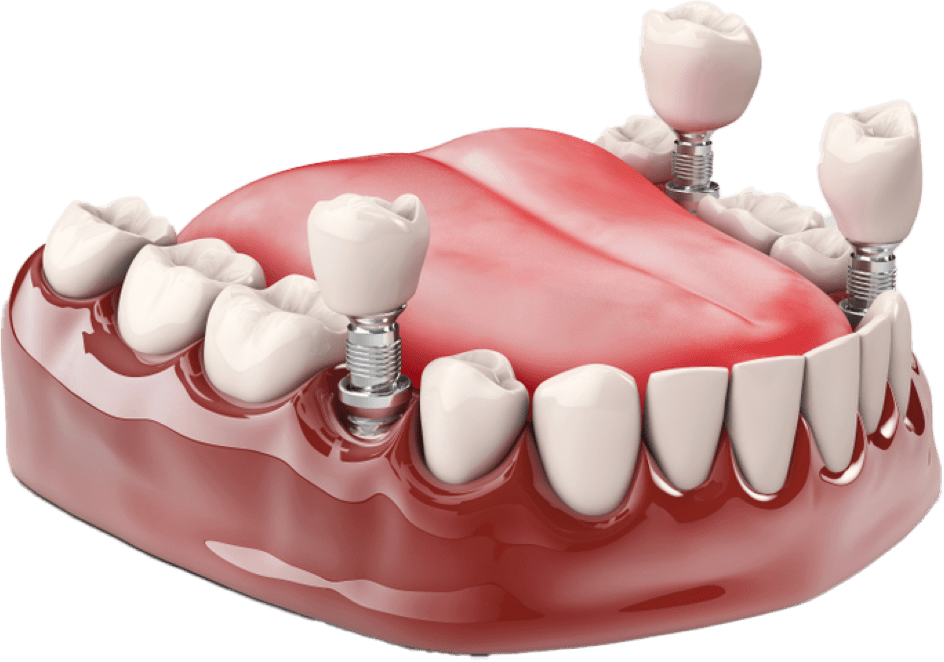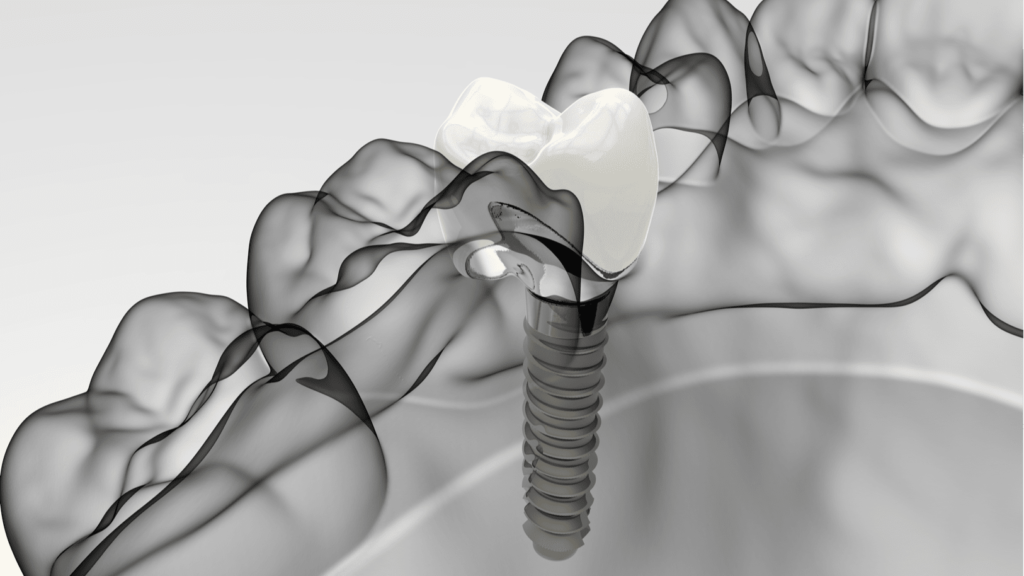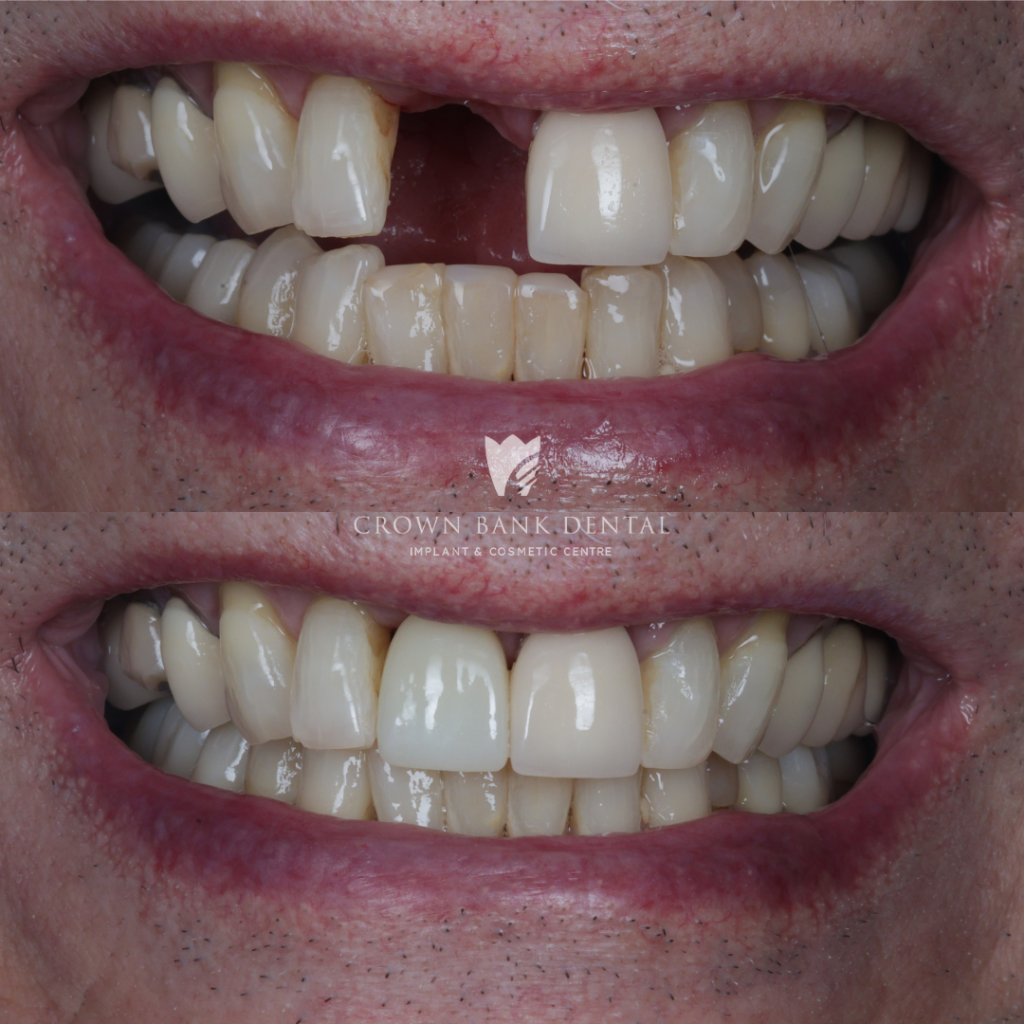Dental Implants Cheshire
- Home
- /
- Dental Implants Cheshire


Dental implants are revolutionising the way we approach tooth replacement. Implants offer a durable, natural-looking solution for patients with missing teeth. The team at Crown Bank Dental has done countless dental implant procedures over the years, and we can consult with you as well. We’ll learn more about your dental health and determine whether you’re a viable candidate for dental implants at our Cheshire dental practice.

If you have done some research into dental implants, you’re probably aware of the multi-step procedure. Getting new, permanent teeth takes time, but our team will be here to guide you through the process. We begin with a consultation to assess your needs and treatment goals. From there, we take the following steps:
Examination and X-Rays—We will evaluate your oral health, take X-rays and create digital scans of your mouth to plan for implant placement.
Implant Placement—Next, you’ll undergo a minor surgical procedure to carefully place a titanium post into the jawbone. This lays the foundation for your new, permanent teeth.
First Healing Period—Over the next several months, you’ll wait as the implant heals and integrates into the bone.
Abutment Attachment—Once you’ve healed from the initial procedure, we can attach an abutment to the implant to support the new tooth.
Crown Placement—We finish the dental implant procedure by attaching a custom-made crown to the abutment. This allows for a natural look and restores the full functionality of your teeth.
[Dr. Mehdi Yazdi speaking]
“At Crown Bank Dental, we offer a wide array of treatments to best suit our patients and their needs. We primarily focus on advanced treatments and ensuring that the mouth is healthy. Should patients wish to enhance the aesthetics of their smile, we have cosmetic treatments available, such as the replacement of missing teeth with dental implants.
Dental implants enable you to have secure, fixed teeth that function and look really natural. They are an excellent way of replacing missing teeth. If patients have teeth that are unfortunately beyond repair and need removing, dental implants can be placed, in certain situations, straightaway. This allows us to connect teeth that are secured and fixed because they’re not reliant on the support of any adjacent teeth. So those adjacent teeth aren’t compromised.
With dental implants, there isn’t the lack of confidence like you would have with a denture, which you may have stability issues with. A denture may feel loose or come out at an unexpected time. Dental implants are really good for addressing these concerns.
Our patients report very frequently that they are able to eat all of their favourite foods – biting into steak, having pizza, biting into apples, feeling and hearing that crunch. It’s really satisfying to be in a position to be able to provide that for our patients here at Crown Bank Dental.”
When we consider dental implants for missing teeth, we account for the benefits of each type of implant. The most common variety is the endosteal implant. This technique involves placing the titanium post directly into the jawbone and is suitable for patients with adequate bone density. However, some people do not have the bone mass to support endosteal implants. In this case, we may recommend subperiosteal implants. These are placed beneath the gum but above the jawbone, making them ideal for patients who cannot undergo bone grafting procedures. We offer an array of dental implant products for our patients including:
Dental implants offer a multitude of benefits that make them a preferred choice for patients with missing teeth. We love helping our community members take advantage of these benefits:
Preservation of Jawbone—By stimulating the jawbone, implants help prevent bone loss, maintain facial contours and avoid a sunken appearance.
Better Stability—Dental implants are firmly anchored in the jawbone, eliminating the risk of shifting or loosening teeth.
Longevity—With proper care, implants can last for years, often decades.
Natural Appearance and Feel—Implants mimic the look and function of natural teeth. Implants allow you to eat, speak and smile with confidence without the fear of slippage associated with traditional dentures.
Patients without enough bone density may not be able to support dental implants. However, the team at Crown Bank Dental still wants to provide you with a beautiful smile.

If you have insufficient bone volume, we’ll explore a range of solutions. Using our state-of-the-art Cone Beam Computed Tomography (CBCT) scanner, we can pinpoint exactly where you’re lacking healthy bone. We may suggest the following methods to increase your bone density:
It’s possible to use your own bone, donor bone or synthetic bone to reconstruct the bone in the jaw so that dental implant treatment can proceed. After placing new bone, the native bone begins to grow and replace the graft material.
We can increase the height of available bone in the upper jaw by performing a sinus lift procedure. Sinuses are the natural air spaces of our upper jaws, and we can raise the lining of the sinus to create room for the growth of new bone. This then makes it possible to place dental implants. We often perform bone grafting at the same time.
Recovery is an important part of the dental implant process, and knowing what to expect can ease any concerns. Immediately after the procedure, it’s normal to experience some swelling and mild discomfort, which can be managed with over-the-counter pain medications and ice packs.
Your dentist will provide specific post-operative instructions to promote healing, such as maintaining a soft-food diet and avoiding strenuous activities. Good oral hygiene is also essential during recovery, so be sure to follow your dentist’s recommendations for cleaning and care. With proper care and attention, most patients experience a smooth recovery and can enjoy their smile restoration in no time!

Proper maintenance of your dental implants is key to ensuring their longevity and effectiveness. Daily oral hygiene practices, such as brushing and flossing twice a day, are essential to keep your implants and surrounding gums healthy. Fortunately, dental implants require no special cleaning or upkeep techniques! Remember to schedule regular dental check-ups, as your dentist will monitor the condition of your implants and address any potential issues early on.
The dentists at Crown Bank Dental have years of experience serving patients in Cheshire. We have a deep understanding of dental implants and can ease your concerns about the procedure. Our team aims to ensure every patient feels comfortable once they step inside our doors. Contact us today to schedule a dental implant consultation. Learn more about the cost of dental implants in Cheshire below.
Dental implants are titanium screws that act as replacement tooth roots. A fixed or removable smile restoration like a crown, bridge or denture can then be attached over the top of the implant.
As the process is performed under local anaesthetic, you won’t feel anything while the implant is being placed. You may experience some mild discomfort for a couple of days after the procedure, which is well controlled with over-the-counter (OTC) painkillers. If you’re at all worried about any pain after replacing missing teeth, please get in touch with us.
Dental implants feel very similar to natural, permanent teeth. Whilst your restoration might feel a bit different when it’s first placed over the top of your implant, you will quickly acclimatise to its presence. Smiling, chewing and speaking will soon become second nature.
Implant fees are £2,995 per implant site
Includes:
-Surgical guide stent
-Bone grafting and bone manipulation at the time of implant placement
-Implant placement and healing abutment
-Removal of stitches and review appointment
-Impressions digital or moulds
-Fitting of single tooth implant crown
-All required small x-rays
A single completed implant includes all of the surgery, materials, review appointment, time and x-rays.
This cost does not include:
-The removal of any teeth required for your treatment
-A temporary tooth to fill a gap (not required for a tooth at the back of the mouth)
-Implant uncovering appointment, which may be necessary if at the time of implant placement, gum has been placed over the implant to provide further protection during healing
-Any bone augmentation such as sinus lifts (sometimes required for replacing upper back teeth) or bone manipulation and grafting required prior to implant placement
With the right care, dental implants have the potential to last your whole life. Problems like poor oral hygiene, smoking and gum disease can threaten the life of your implant, so it’s incredibly important that you attend dentist and hygienist appointments on a regular basis. In some very rare cases, implants can fail. However, the success rate is 95%, making them a viable option for most patients. Keep in mind that the restoration sitting over the top of your implant (crown, bridge or dentures) may require replacement or maintenance, just like a real tooth.
With the right care, dental implants have the potential to last your whole life. Problems like poor oral hygiene, smoking and gum disease can threaten the life of your implant, so it’s incredibly important that you attend dentist and hygienist appointments on a regular basis. In some very rare cases, implants can fail. However, the success rate is 95%, making them a viable option for most patients. Keep in mind that the restoration sitting over the top of your implant (crown, bridge or dentures) may require replacement or maintenance, just like a real tooth. If you are missing all of your teeth in your upper or lower jaw or your remaining teeth have a poor prognosis, implants can be used to replace all of your teeth. There are often fixed (implant bridge) or removable (implant overdentures) options.
Full Arch Fixed Implant Bridge also known as ‘All-On-4’ or All-On-X’:
A full arch implant bridge is a fixed bridge held in position in your jaw and secured with dental implants. Full arch fixed bridges replace all of your teeth in the respective jaw.
The fees for this treatment range from £14,500 to £19,500 per jaw, depending on the number of implants required and bridge prosthesis materials selected.
Removable Implant overdentures (clip in dentures):
Implant overdentures are dentures stabilised by dental implants, making the wearing of a denture more comfortable and secure.
Upper Jaw: A minimum of 4 implants are required for an upper implant overdenture. The fees are £8,500 (includes 4 implants, guide stent, bone grafting at implant sites, review and impression appointments, implant abutments and overdenture prosthesis).
Lower Jaw: A minimum of 2 implants are required for a lower implant overdenture. The fees are £4,750 (includes 2 implants, guide stent, bone grafting at implant sites, review and impression appointments, implant abutments and overdenture prosthesis).
With the right care, dental implants have the potential to last your whole life. Problems like poor oral hygiene, smoking and gum disease can threaten the life of your implant, so it’s incredibly important that you attend dentist and hygienist appointments on a regular basis. In some very rare cases, implants can fail. However, the success rate is 95%, making them a viable option for most patients. Keep in mind that the restoration sitting over the top of your implant (crown, bridge or dentures) may require replacement or maintenance, just like a real tooth.

“Very polite and pleasant staff. Made to feel very comfortable stress free.”

“The staff were all very pleasant, kind & caring, Covid prevention was high on their list & I felt safe…”

“Brilliant dentist. I had a 4 hour appointment today for replacement veneers. I Will explained every step of my treatment.…”

“I was dealt with in a professional and friendly manner. The treatment took one hour to complete. During this time…”

“I'm a nervous patient, took me years to pluck up the courage to book a dentist appointment. The staff here…”